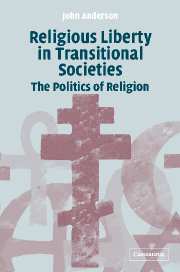Book contents
- Frontmatter
- Contents
- Preface
- 1 Introduction
- 2 Southern Europe: Spain and Greece
- 3 Central and Eastern Europe: Poland and Bulgaria
- 4 The former USSR: Russia and the successor states
- 5 Justifying religious ‘recognition’ and/or discrimination
- 6 Conclusion: culture, conflict, modernisation and religious liberty
- Select bibliography
- Index
3 - Central and Eastern Europe: Poland and Bulgaria
Published online by Cambridge University Press: 22 September 2009
- Frontmatter
- Contents
- Preface
- 1 Introduction
- 2 Southern Europe: Spain and Greece
- 3 Central and Eastern Europe: Poland and Bulgaria
- 4 The former USSR: Russia and the successor states
- 5 Justifying religious ‘recognition’ and/or discrimination
- 6 Conclusion: culture, conflict, modernisation and religious liberty
- Select bibliography
- Index
Summary
The impact of democratisation on religious life in Central–Eastern Europe after 1989 was far greater than in Southern Europe, for the simple reason that here dictatorship had been accompanied by an active hostility to religious ideas and institutions. In Poland and Bulgaria the party-states maintained a formal commitment to atheism until the end, though in the former this had effectively been rendered meaningless by the late 1970s and in the latter it was pursued with only intermittent, although sometimes brutal, bursts of enthusiasm during the later Zhivkov years. More importantly, the response of the churches in the two states had been very different, with the Polish Catholic Church gradually carving out a position for itself as defender of the nation and human rights, whilst the Bulgarian Orthodox Church retreated into a liturgical role that offered no challenge to the state and its policies. This in turn had much to do with the nature of the regimes – with the Polish leadership reluctant to opt for the full Sovietisation that was required of, or chosen by, the Bulgarian elite – but also with the religious traditions of the country. Whilst the Bulgarian church had in the nineteenth century been as committed to national defence as its Polish counterpart, the fact remained that the Polish church came to play in the twentieth century a much more prominent role as protector of the nation and this may have owed at least something to the cultural differences between the religious traditions of the Russian oppressor and the oppressed, differences that were absent in the Bulgarian case.
- Type
- Chapter
- Information
- Religious Liberty in Transitional SocietiesThe Politics of Religion, pp. 69 - 114Publisher: Cambridge University PressPrint publication year: 2003



